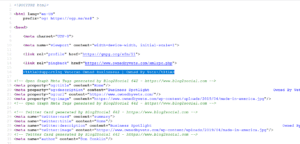
What are Website Meta Tags
Your website’s meta tags provide the information or description about your web page in your web page’s source code or HTML. This information is called the web page’s “metadata” and it is not displayed on the page itself, but it is vital because it can be read by search engines and web crawlers “bots”.
Search engines such as Google, Yahoo and Bing use the meta data from meta tags to determine what that particular web page is about. They will then use this information for the search engine ranking purposes, to display the meta snippets in  search results or exclude the meta tags depending on the situation.
search results or exclude the meta tags depending on the situation.
Your website’s meta tags are the key to telling your story, optimizing your meta tags is an important aspect of any SEO program making it a fundamental to your internet marketing strategy. Meta tags help the search engines identify your website and place it accordingly among your competitors. When I do website audits, one of the first things I look at are if meta tags are optimized or not.
Traditional Meta Tags
There are four traditional meta tag elements used in basic SEO (search engine optimization).
– Title Tags
A title tag is an HTML element in the source code that indicates the title of a web page. Title tags are displayed in search engine results pages (SERPs) as the clickable headline, and can be seen at the top of your browser window tab. The title tag of your web page is meant to be an accurate description of your page’s content or information. Someone doing a search should easily identify your webpage by your title tag.
The google search engine will typically display the first 50–60 characters of a title tag. By keeping your titles under 60 characters, you can expect your page title to be displayed properly without being cutoff.
Your website’s meta title tags are a key factor in helping search engines understand what your page is about which allows them to rank them in search appropriately. A website’s title tags are seen in three key places on the internet: when you do searches, search engine results pages (SERPs), in web browsers, and on social networks.
You want to make sure that the theme of your webpage is identified within the first few characters of your title tag.
– Meta Descriptions
The meta description is an HTML attribute that provides a brief summary of a web page. Search engines such as Google often display the meta description in search results, which can influence click-through rates.
Meta descriptions can be any length, but Google generally truncates snippets to ~155–160 characters. It’s best to keep meta descriptions long enough that they’re sufficiently descriptive, so we recommend descriptions between 50–160 characters. Keep in mind that the “optimal” length will vary depending on the situation, and your primary goal should be to provide value and drive clicks.
The meta description tag serves as your websites advertising, drawing readers to your website from the SERP, making it an important part of search marketing. Creating a description that utilizes your important keywords cannot only improve your organic search, but also improve the click-through rate for a given webpage. To maximize click-through rates on search engine result pages,
Keep in mind that social media sharing sites like Facebook commonly use a page’s meta description tag as the description that appears when the page is shared on their social sites. Without the meta description tag, social media sites may just use the first text they can find. Depending on what the first text on your page is, this might not create a good user experience for people encountering your content from social media.
– Optimized Urls
Search engines and users may have problems with complicated URLs, clear and simple URLs that contain important keywords that are associated with the webpage make it easier for the search engines to classify your webpage.
For example, when seen on a search engine results page (SERP), a clear URL will reassure the person searching that a page will deliver what they are searching for.
Where possible, instead of using parameters in your URLs, it’s simpler, clearer and more descriptive to use real words.
– Meta Keywords
While meta keywords are no longer as important to SEO as they were in the early days of the search engines, they can still be a key piece in identifying your website for the search engines. Meta keywords are different from regular keywords that you use within the frontend of the website because they appear in the source code of your webpage and are laced for the benefit of the search engine “bots”.
The important thing to remember when utilizing meta keywords is to make sure they relate to your webpage and you do not “stuff” a large amount of meta keywords in your source code in hopes of gaining more traffic. Using 5 – 6 specific keywords will be more effective in helping your website maintain a good score in the search engines.
Take the Time to Review Your Meta Tags
It is essential that website owners take the time to review and optimize their meta tags so that they are up-to-date with the current standards outlined by the search engines. Without proper meta tags, your website will languish deep in the search page results and will not stand out especially if your website is in a competitive industry.
TYFYS
SMC
Email me with any questions you might have